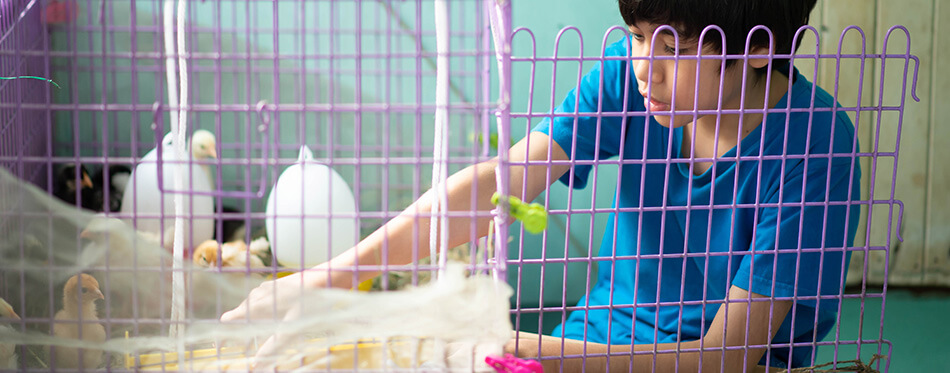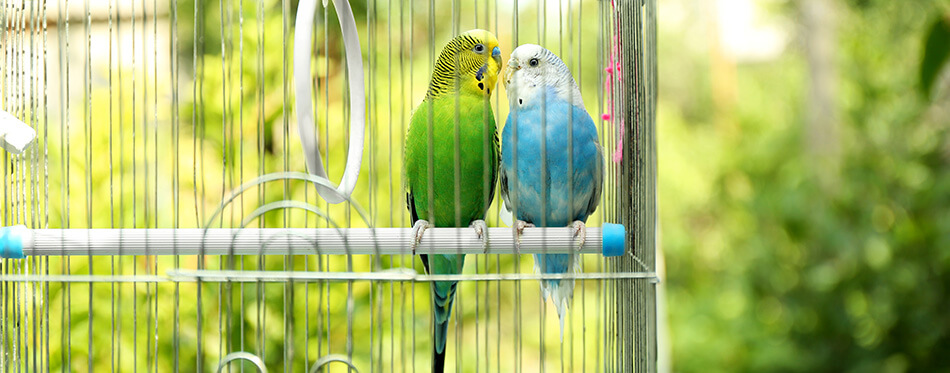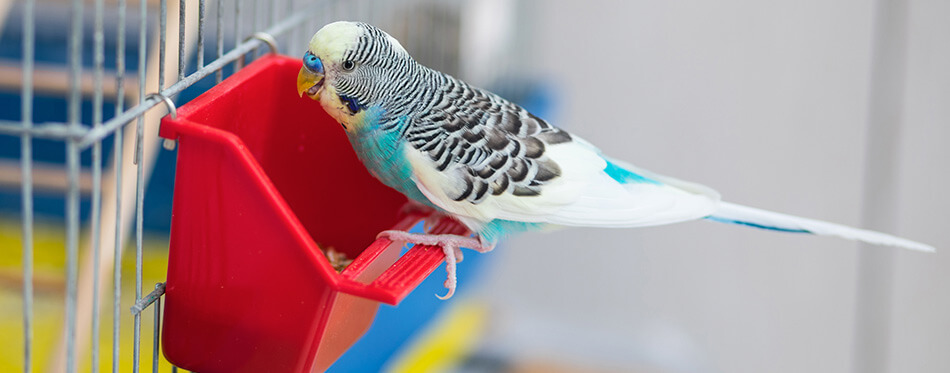Keeping your bird friend healthy relies on love, affection, good food, and a safe, clean environment. As with any pet, keeping their surroundings clean is necessary not just for their mental health but for their physical well-being too. Birds are extremely sensitive to bacteria so it’s important that their cages are maintained and kept germ-free to protect them from infection or disease.
It may sound like a big task but cleaning your bird’s cage is surprisingly quick and easy once you’re in a routine. This guide aims to provide you with everything you should know about how to keep a bird cage clean before you dive in headfirst.

What You’ll Need
First, make sure you have all your supplies ready before you start cleaning a dirty bird cage. Your cleaning supplies should include a scrub brush or toothbrush, dish soap, sandpaper, cage liners, paper towels or wipes, and a safe area for your feathered friend to roam whilst you clean.
Designated Safe Area
Next, you want to make sure your bird has a safe place to go whilst you clean. This could be a safe open area free from obstruction for them to roam around or an alternate cage. If you opt for the former, make sure they are kept away from you as their natural curiosity could lead to frequent interruptions or trouble.
If you don’t already have another bird cage to make use of when cleaning your bird’s home, and could really use one, PetSide has an up-to-date and practical guide to the best cages.
Friendly Bird Cage Disinfectant
Birds are sensitive to a lot of household cleaners as well as other pet care supplies so when shopping for a disinfectant always make sure that it is safe for your feathered friend before you purchase.
Cleaning Bird Cage With Vinegar And Other Solutions
White vinegar or apple cider vinegar can be used to remove stubborn and hard-to-clean dirt from your bird’s cage. To do this you will need to mix 1 part vinegar with 2 parts of warm water then add the solution to a spray bottle for easy use. By diluting the component with water you can use it, with the help of wipes or paper towels, to clean the more difficult areas.
Baking Soda And Lemon Juice
In addition to this, you can also use baking soda combined with lemon juice as an effective way of ridding dirt and grime from the cage. All you will need to do is mix 3 cups of warm water, 2 tablespoons of lemon juice, with 3 tablespoons of baking soda to get your solution. This should also be added to a spray bottle to make cleaning simple and to avoid excess solution dropping everywhere.
Rest Assured
It’s important to note here that both kinds of vinegar, lemon juice, and baking soda are not toxic to your birds and are perfectly safe to use.
Diluted Bleach – Use With Caution
If you do not have access to the disinfectants above, a bleach solution can be used as an alternative approach. You can make a safe solution by adding half a cup of bleach to a gallon of water however when using the fluid, make sure you are in a well-ventilated area. Additionally, your pet bird should be nowhere near you or the cage when using this substance as the toxic fumes can be immensely harmful.
On top of that, always make sure that you thoroughly rinse the cage completely so no excess solution is left behind. The cage should then be left until completely dry – you can wipe the cage down with a towel to allow it to dry faster although you can leave it to air-dry. Once the pungent odor clears entirely, it’ll then be safe to reassemble your cage.
Cage Liners
Cage liners are 100% necessary as they will catch the majority of the loose droppings and other things to land at the bottom. They allow owners to inspect any abnormalities in feces or feathers should anything be amiss with your bird.
Newspapers and other paper liners are safe to use in your bird’s cage and can be replaced easily. Although, if you use newspapers, ensure that are black and white ink only, as colored ink can be toxic to your pet.
Disposable Gloves
Exposure to chemicals will leave your skin feeling rough, dry, and can even damage them so it’s important to protect your hands while you clean. Get yourself some disposable gloves or some household cleaning gloves before you buckle down.
Other Safety Gear
Goggles may also be necessary if you are using a bleach solution to protect your eyes from fumes or rogue splashes of fluid.

How To Clean A Bird Cage
When you have your supplies handy you should assess what part of the cage needs the most attention. Whether it’s food dishes, perches, toys, or the whole cage, we have broken down what needs to be cleaned, how to clean it, and how often it should be cleaned. We’ve also provided some important tips at the end to help you maintain your beaky bud’s home.
How Often Should a Bird Cage be Cleaned?
Just to clarify, you absolutely do not have to disassemble your entire cage every single day, however, it’s important to know that there are things that you should do daily, weekly, and monthly to keep your bird happy and their home safe.
Daily Cleaning
Food and water dishes
To clean their food dishes all you need is hot soapy water. The same applies to their water dishes too. Additionally, if you rely on a water bottle this must also be cleaned daily with an appropriate bottle brush to keep it hygienic.
Standard dish soap can be used however eco-friendly and pet-appropriate soap can be purchased from pet stores if necessary. It’s also worth noting that you can buy food bowls that are dishwasher safe if this is something that would be convenient.
By cleaning your bird’s food dishes frequently, you are eliminating the chance of bacteria growth and therefore protecting your pet from unnecessary and harmful infections. If your cage also has a birdbath it is also crucial to clean this daily, especially if your bird loves to go for a dip.
After washing the food and water dishes with hot soapy water, make sure you rinse them with clean water before leaving them to dry. Do not add any food to their bowls until they are dry as damp seed and pellets can quickly turn bad and wreak havoc on your pet’s health.
Cage Liner
Birds may often favor a perch but that doesn’t mean they don’t like to take a stroll at the bottom of the cage on occasion. Your bird’s cage liner must be replaced daily, but before you replace it with a fresh liner, make sure to wipe the bottom down with a damp rag to remove any discarded food or excess paper clinging to the bottom. As an extra tip, you can always use several sheets of paper to soak up droppings and other debris that often falls to the bottom of the cage.
Spot Clean
Use a damp cloth or paper towel to clean down other cage components such as toys, perches, and the cage itself if necessary.
Note: If you consider your bird mellow and not a flight risk, it’s ok for them to remain in their environment as you clean these cage accessories. You can also save time by simply replacing dirty food and water dishes with spare, fresh ones rather than limiting your bird’s access to food and water while you clean.
Weekly Cleaning
At least once a week there are certain things you should inspect and clean thoroughly. These include the following:
Cage Accessories
Wooden accessories must be removed from the cage and washed in hot soapy water at least once a week. Sometimes, these parts may need to be left to soak for about ten minutes to ensure they are cleaned properly and that any droppings will come off. This is also where sandpaper is useful as you can use it to remove hardened and stubborn droppings from wooden perches.
Toys
Toys and other accessories must be cleaned weekly also. Some toys such as plushies and softer ropes may be dishwasher safe or may even go in the washing machine itself if you have laundry to do, but always make sure you check to see if it’s ok to do so beforehand.
Note: If you can, make sure you have clean toys and perches ready to replace the ones you’re taking out if you don’t have access to an alternate cage to place your bird in.
Cage Tray And Grate
In addition to cleaning the tray, some bird cages contain a grate at the bottom, above the tray, that will need cleaning once a week at least. This is where your cage cleaner will come in handy again as you will need to disinfect these items. After applying your disinfecting solution, you will need to use a non-adhesive scrubbing pad to effectively rid the parts from obstinate droppings. You may also find it easy to wash this particular item in the bathtub if you have one.
Monthly Cleaning
This deep cleaning process should not be neglected if you want to keep your bird healthy and safe. This requires pet owners to take the cage apart piece-by-piece so that every single part can be cleaned thoroughly. Depending on the size of the cage, you will need enough floor space to be able to take it apart to disinfect it meticulously. Some have been known to take smaller cages into bathrooms or large ones outside for convenience.
After taking the cage apart you will need to use a scrub brush and your bird cage cleaners to get into all of the difficult nooks and crannies. This will also be handy for cleaning the bars too, especially where they join and merge together as bacteria often collate in these spots.
Once you’re happy you’ve scrubbed every inch, you will need to rinse the cage completely to rid it of any excess cleaning solution that has remained. Then you will need to wipe it down and make sure it’s completely dry before you place your bird back inside. If possible, let the cage air-dry to make sure all dampness and moisture are gone. That’s everything you need to do to thoroughly clean a bird cage. Deep cleaning = No problem!

More Tips
How To Keep Area Around Bird Cage Clean
Keeping the surrounding area of the cage clean is necessary, not only for your bird but for yourself and others too. Most use a vacuum cleaner or broom to remove seeds, feathers, and other debris that has fallen out of the cage and onto the surface and/or floor. Make sure to clean the sides, and any adjacent walls to ensure no dirt is left to grow bacteria or fungus.
Cage Apron
A cage apron can simply be thrown in with the rest of the laundry when needed however, make sure to rid them of old food and other rogue pieces that may have fallen out of the cage and onto it. Incidentally, if you don’t already have one, it may be worth investing as an apron is a handy addition and is easy to clean.
Keep A Cleaning Schedule
Cleaning your bird’s home isn’t as difficult or as time-consuming as you may think and after you get into a regular cleaning routine it’ll become second nature. By carefully picking a specific day/date to dedicate to cleaning their cage you will be unlikely to delay it and the habit will eventually stick. This also means that it won’t disrupt your other commitments and schedule.
Designated Cleaning Space And Cover
Another handy-dandy tip would be to allocate a specific area of your home to clean your cage in. Some bird owners use a cover to shield their floors from dirt and other debris as they clean.
If You Have Multiple Pet Birds
How often you clean a bird cage may also depend heavily on how many birds you have and the size of their habitat. Larger cages with more birds will require you to clean them more often as will a standard cage used for larger birds as they are likely to create more mess. Remember: their cage is their home and safe space, so hygiene is a top priority to making your bird feel relaxed and will also keep them in good health.

